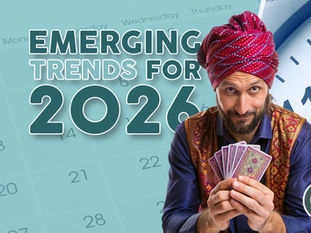
ARE VIRTUAL EVENTS MORE TIRING THAN FACE TO FACE ONES?
1
0
0
In short, yes.
Attending any kind of virtual event, regardless of how engaging, and effective, is much more tiring than attending a live event.
But why? There are a number of reasons, all of which developers and hosts of such events should be aware of.

To help us understand what makes virtual events so tiring we referred to a recent article for BBC Worklife with Gianpiero Petriglieri, an associate professor at Instead who explores sustainable learning & development in the workplace and Marissa Shuffler, an associate professor at Clemson University who studies workplace wellbeing and teamwork effectiveness.
“Being on a video call requires more focus than a face-to-face chat” says Petriglieri.
Attending a virtual event means we need to work harder to process non-verbal cues like facial expressions, the tone and pitch of the voice, and body language.
This intense focus with sustained eye contact, especially in the absence of many non-verbal cues, is draining. “Our minds are together when our bodies feel we're not. That dissonance, which causes people to have conflicting feelings, is exhausting. You cannot relax into the conversation naturally,” he says.
As mentioned, in face-to-face events we rely heavily on non-verbal cues to make emotional judgements, such as assessing whether a statement or person is credible.
When face to face, we automatically take in information such as is the person fidgeting? Are they looking at me when they speak? Predominantly relying on verbal information to infer emotions is tiring.
In addition, we generally have to focus more to absorb information during a webinar or online meeting. Think of it this way: if you get distracted whilst you’re sitting in a workshop or meeting you can nudge the person next to you if you missed something to catch you up.
During a virtual event it’s impossible to do this unless you use the private chat feature, or awkwardly try to find a moment to unmute and ask the host or fellow attendee to repeat themselves.
It’s even more tiring if you are the host, as when we’re physically on camera, we’re very aware of being watched. “When you're on a webinar or video conference, you know everybody's looking at you; you are on stage, so there is the social pressure and feeling like you need to perform, which is nerve-wracking and more stressful.” Says Petriglieri.
It’s also very hard for people not to look at their own face if they can see it on screen, we find it difficult not to be conscious of how we behave in front of the camera, which is an added thing to think about, which, unsurprisingly, tires us out.
Silence is another challenge, says Petriglieri. “Silence creates a natural rhythm in a real-life conversation, but when it happens during a video call, or other online event, everyone becomes anxious about the technology.”
Silence also makes people uncomfortable. One 2014 study by German academics showed that delays on phone or conferencing systems shaped our views of people negatively: even delays of 1.2 seconds made people perceive the responder as less friendly or focused.
In addition, frustration with people turning their microphones on and off and background noise mean online events rarely flow smoothly, which yes, you’ve guessed it, wears us out.
Adding fuel to the fire is that given the ‘new normal way of working’ many of us are working from home and feeling anxious about how our remote workspace might reflect poorly on our brand.
Thoughts like ‘will my webinar background suddenly fail, leaving my hoarding tendencies on full display?’ or ‘will my kids come barging in screaming and crying?’ only add to our weariness.
And because of our new way of working we’re no longer just dialling into one or two virtual events, which for some of us means we’re having to find polite new ways to ask our loved ones not to disturb us. For those who don’t have a private space to work, this is especially challenging.
Virtual events also make it easier than ever to become distracted.
We’ve all done it: decided that we absolutely can listen intently whilst checking our emails, and liking someone’s photo on Instagram. Except, of course, we can’t, and we end up feeling worried about what we’ve missed and having to re-watch at another time, adding to our ever-growing to-do lists.
So, given all of this, what can we do when developing virtual events to alleviate this fatigue for not only our audiences, but for us as host?
Here are our top tips:
1. How long a virtual event last plays a big part in dwindling levels of focus and increased levels of fatigue, so it goes without saying that one of the biggest ways to manage this is to manage the duration. Avoid prolonged events. Where the event is longer than 50 minutes, factor in regular comfort breaks. Designing events that don’t adhere to the classic 30 minute, or one hour durations, allow the audience the opportunity to have a little downtime before their next commitment. This is a subtle way of showing that well-being is a consideration in your event design. If your event is to replace an entire days face to face event, split it over two days.
2. Encourage people to turn their cameras off to help them to relax and not worry about how they are being perceived on screen. Also advise that having the camera to the side of you, so you’re not facing into it head on, can be less tiring and actually help concentration, particularly in group events.
3. If you will be hosting regular virtual events consider investing in a background that you can have displayed behind you throughout the duration of the event, this will help alleviate concern about what your audience can see behind you.






